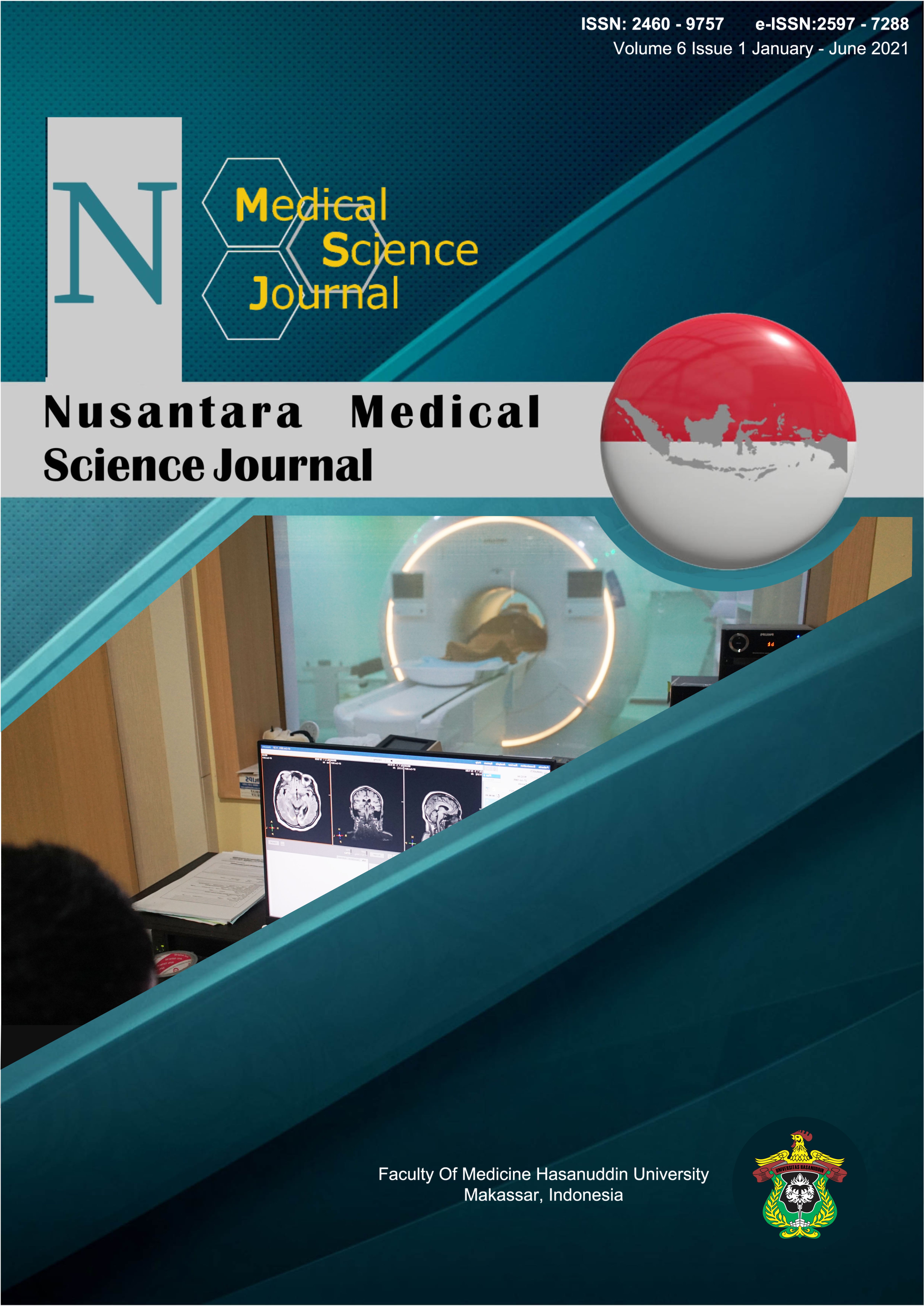Comparison of Helsinki CT and Rotterdam CT Scoring Systems As Prognostic Factors of Brain Injury
DOI:
https://doi.org/10.20956/nmsj.v6i1.13967Abstract
Introduction: Brain injury is a major cause of death and disability. Computerized Tomography (CT) scanning of the brain is essential for diagnostic screening in need of neurosurgical intervention and also provide information about patient prognosis. Methods: This study is a retrospective study design to assess the comparison of the CT scan scoring system of the head with the prognostic factors of brain injury. Head CT Scans were assessed according to the following Rotterdam and Helsinki CT Scores. All patients were managed according to standard guidelines. Surgery was performed as indicated. The primary objective was mortality assessed using the Glasgow Outcome Scale (GOS) at discharge and 3 months after. Results: Altogether, 60 patients were included. The results of the ROC analysis of the two CT scoring systems, the Helsinki score provided a better sensitivity score> 80% compared to the Rotterdam score, with a positive predictive value of around 74% each for assessing the outcome (GOS) of brain injury patients Conclusions: The Helsinki score scoring system provides a better sensitivity compared to the Rotterdam score
References
Chen H, Gou Y, Chen SW, Wang G, Cao HL, Chen J, et al. Progressive Epidural Hematoma in Patients with Head Trauma: Incidence, Outcome, and Risk Factors. Emergency Medicine International. 2012; 2012: (8 p).
Lalenoh DC, Tatang B, Yusuf I. Brain Protection Effect of Lidocaine Measured by Interleukin-6 and Phospholipase A2 Concentration in Epidural Haematoma with Moderate Head Injury Patient. Journal of Anesthesia & Clinical Research. 2014; 5(3): (8 p).
Marshall LF. Outcome prediction in severe head injury. 2nd ed. In: S, W. R. A. R. (ed.). Neurosurgery. New York: Mc Graw Hill; 1996.
Raj R, Siironen J, Skrifvars MB, Hernesniemi J, Kivisaari R. Predicting outcome in traumatic brain injury: development of a novel computerized tomography classification system (Helsinki computerized tomography score). Neurosurgery. 2014; 75(6): 632-647.
Prins M, Greco T, Alexander D, Giza CC. The Pathophysiology of Traumatic Brain Injury at a Glance. Dis Model Mech. 2013; 6(6): 1307-1315.
RISKESDAS. Riset Kesehatan Dasar. Jakarta: Badan Penelitian dan Pengembangan Kesehatan. Kementerian Kesehatan Republik Indonesia; 2013.
Zainuddin SZ, Kwandow L, Akbar M, Muis A, Kaelan C, Patellongi I. Hubungan Amnesia Post Trauma Kepala dengan Gangguan Neurobehavior pada Penderita Cedera otak Ringan dan Sedang. Repository Universitas Hasanuddin. 2014.
Roozenbeek B, Lingsma HF, Lecky FE, Lu J, Weir J, Butcher I, et al. Prediction of Outcome After Moderate and Severe Traumatic Brain Injury: External Validation of the International Mission on Prognosis and Analysis of Clinical Trials (IMPACT) and Corticoid Randomisation After Significant Head injury (CRASH) Prognostic Models. Crit Care Med. 2012; 40(5): 1609-1617.
Mailles A, Broucker T, Costanzo P, Almoyna LM, Vaillant V, Stahl JP, et al. Long-term Outcome of Patients Presenting With Acute Infectious Encephalitis of Various Causes in France. Clinical Infectious Diseases. 2012; 54(10): 1455-1464.
Putra, M.B. 2019. Karakteristik pasien cedera kepala di Rumah Sakit Umum Daerah (RSUD) Umbu Rara Meha Waingapu periode 1 Januari 2017 – 31 Desember 2018. Intisari Sains Medis 10 (2): 511-515.
Faul M, Coronado V. Epidemiology of traumatic brain injury. Handb Clin Neurol. 2015;127:3-13.
Katar S, Ozturk PA, Ozel M, Arac S, Evran S, Cevik S, et al. The Use of Rotterdam CT Score for Prediction of Outcomes in Pediatric Traumatic Brain Injury Patients Admitted to Emergency Service. Pediatric Neurosurgery. 2020: 55(5): 237-243.
Lindfors M, Lindblad C, Nelson DW, et al. Prognostic performance of computerized tomography scoring systems in civilian penetrating traumatic brain injury: an observational study. Acta Neurochir. 2019; 161: 2467-2478.
Pargaonkar R, Kumar V, Menon G, Hegde A. Comparative study of computed tomographic scoring systems and predictors of early mortality in severe traumatic brain injury. Journal of Clinical Neuroscience. 2019; 66: 100-106.
Maas AI, Steyerberg EW, Butcher I, Dammers R, Lu J, Marmarou A, et al. Prognostic value of computerized tomography scan characteristics in traumatic brain injury: results from the IMPACT study. J Neurotrauma. 2007; 24(2): 303-314.
Yao S, Song J, Li S, Cao C, Fang Li, Wang C, et al. Helsinki Computed Tomography Scoring System Can Independently Predict Long-Term Outcome in Traumatic Brain Injury. World Neurosurgery. 2017; 101: 528-533.
Downloads
Published
How to Cite
Issue
Section
License
Copyright (c) 2021 Nusantara Medical Science Journal

This work is licensed under a Creative Commons Attribution 4.0 International License.









